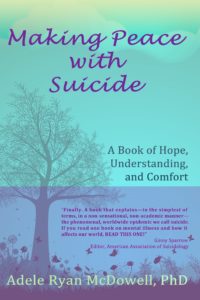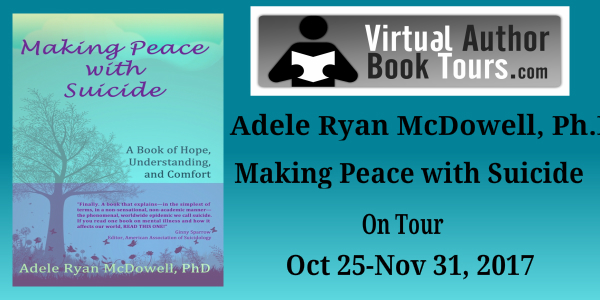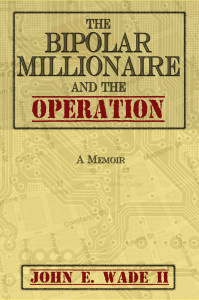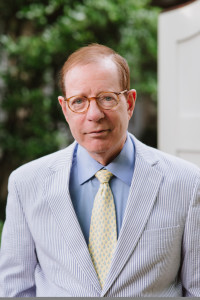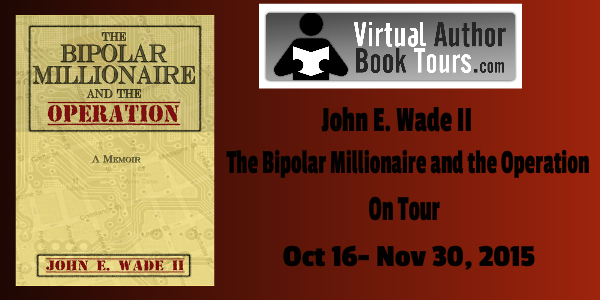 Making Peace with Suicide by Adele Ryan McDowell, Ph.D.
Making Peace with Suicide by Adele Ryan McDowell, Ph.D.
Publisher: White Flowers Press (Oct 28, 2014)
Category: Self-Help, Mental Illness, Grief, Psychology
Tour dates: Oct/Nov, 2017
ISBN: 978-0982117620
ASIN: B00S46SGFI
Available in Print & ebook, 232 pages
Insightful, compelling, and compassionate, Making Peace with Suicide: A Book of Hope, Understanding, and Comfort takes a good hard look at the world-wide phenomena of suicide. This book is designed for anyone who has lost a loved one to suicide and felt that sucker punch of grief; for anyone who is in pain, walking unsteadily, and considering suicide as an option; and for anyone who works with, guides, or counsels those feeling suicidal and/or suffering the profound grief from a suicidal loss.
Making Peace with Suicide includes stories of courage, vulnerability, and steadfastness from both the survivors of suicidal loss as well as the unique perspective of the formerly suicidal. It offers shared wisdom and coping strategies from those who have walked before you. It explores the factors leading to suicide and the reasons why some do and some don’t leave suicide notes.
Making Peace with Suicide sheds light on the phenomena of suicide vis-à-vis our teens, the military, new mothers, as an end-of-life choice, and asks if addiction is a form of slow suicide. It provides a seven-step healing process and opens the door to consider suicide and the soul, the heart lesson of suicide, and the energies of suicide.
If suicidality has impacted your life, Making Peace with Suicide is a must-read. You will be guided through the unknown territory, given insights to allow understanding, stories to help you heal, and ways to make peace with a heart wide-open. Making Peace with Suicide is good medicine for the body, mind, and soul.
Praise for Making Peace with Suicide by Adele Ryan McDowell, Ph.D.
“As a minister/therapist for more than thirty years as well as a wife who lost her military husband to suicide, I have never found a more compassionate, effective book on suicide and its aftermath. This book serves many needs and highlights the myriad ways in which suicide changes one’s life direction. I cannot say strongly enough how powerful and helpful this book is.”–Rev. Colleen E. Brown, Unity minister
“The loss of a loved one by any means is traumatic. When the loss is by suicide, in addition to the grief of the loss itself, survivors are often left riddled with guilt, anger, shame, and endless questioning, by both themselves and by others. In Making Peace with Suicide, Dr. McDowell gently and brilliantly weaves vital suicide survivor education with comforting and inspirational thoughts and quotes, all designed to direct the reader on a path of healing, resolution and peace. A must-read for anyone who has been touched by the tragedy of suicide and left to answer the question, ‘Why?’ ”—Carole Brody Fleet, award-winning and bestselling author of Widows Wear Stilettos…; Happily Even After…; and When Bad Things Happen to Good Women…
“Finally. A book that explains—in the simplest of terms, in a non-sensational, non-academic manner—the phenomenal, worldwide epidemic we call suicide. If you read one book on mental illness and how it affects our world, READ THIS ONE!”–Ginny Sparrow, Editor, American Association of Suicidology
“No topic could be more timely than suicide. This remarkable book addresses people who have contemplated ending their lives as well as those who have to deal with the aftermath of those who succeeded. But it will also be invaluable to mental health workers and military chaplains, especially those who deal with young people who have been bullied and veterans with PTSD. For such a complex topic, Dr. McDowell’s writing style is reader-friendly and the stories she presents may well evoke tears. Her wise recommendations include teaching self-mastery techniques to help people cope with the stress of a success-oriented society. I have read many books on this sensitive topic, but none with the breadth and scope of Making Peace with Suicide.”–Stanley Krippner, PhD; Co-author, Personal Mythology: The Psychology of Your Evolving Self and Haunted by Combat: Understanding PTSD in War Veterans
Interview With Adele Ryan McDowell, Ph.D.
Hi Adele, thanks for joining us today!
TR: Please tell us more about yourself and your qualifications.
ARM:
Thanks, Teddy. I am delighted to discuss the unfolding of my book with you.
I have a doctorate (Ph.D.) in psychology and have been a psychotherapist for 35+ years. I am the author of Balancing Act: Reflections, Meditations, and Coping Strategies for Today’s Fast-Paced Whirl and Making Peace with Suicide: A Book of Hope, Understanding, and Comfort.
In my earlier years, I worked in corporate America, but was always fascinated by psychology. In fact, as a 6th or7th grader, I gave my classmates a self-designed color test predicated on a book I read about Dr. Max Luscher’s psychological color test. Talk about a book that made a difference in my life!
I served as the director of outpatient treatment at an urban drug clinic and was founder/director of The Greenheart Center, a holistic, psychotherapeutic, and psycho-educational non-profit center in Stamford, Connecticut.
I have worked with suicide, domestic violence, and sexual assault crisis hotlines, survivors of Hurricane Katrina, 9/11, the Joplin Tornado, and the Newtown shooting; clients struggling with addiction as well as those moving through profound life changes such as grief and health challenges.
My work focuses on helping clients find hope, balance, and peace in the face of crisis, trauma, abuse, and grief. I look at life through the big view finder, by which I mean a psycho-spiritual-energetic lens.
TR: How much time and effort went into your research for the book?
ARM:
I lost a friend and colleague to suicide in mid-2011. As a consequence, I wrote an article entitled “A Psychologist’s Suicide” to help me make sense of her passing. Shortly thereafter, I was doing dishes at the kitchen sink and was guided to write a book about suicide. Et voila, I began in 2011.
The book was one of the most challenging projects of my life. I interviewed people from all over the world about their loss of loved one by suicide or their own struggles with suicidality. I talked about suicide non-stop. In the beginning, I would be a toast by the end of day. I felt like I had crawled over broken glass and barbed wire, but there came a day when I saw a bigger picture, which was that suicide is one of the all-time greatest teachers about compassion. That understanding helped me turn a corner in my work. It also allowed me to talk about suicide non-stop and without the prior psychic weight.
The book-writing was in fits and starts at the beginning, whereas the end was pretty much non-stop focus. I was tired of the labor pains and ready to birth this baby. It was intense and deeply rewarding. I realized that the writing of this book was a culmination of all of my therapeutic interactions, which makes me so grateful.
TR: How long did it take you to complete?
ARM:
I started in the fall of 2011, and completed the book the end of summer of 2014. It was a three year process.
TR: Tell us about your cover. Did you design it yourself?
ARM:
No, I did not design the cover myself, but I was involved in the process. The cover mattered to me greatly.
I sent an assortment of pictures to my dear friend, big-deal novelist and designer, Meredith Blevins. She had asked me what color palette I wanted and what feeling I’d like the cover to convey.
Meredith chose the exact photo (which I had previously purchased from istock.com) and played with the original photo colors. Then, Meredith did her magic. We played with a few possibilities to birth the final result. I love love love the cover. It is soothing and restful.
TR: What do you do when you are not writing or being the “feel good doctor”?
ARM: Needless to say, I love to read and spend time with family and friends. I also love to play with flowers and dogs (not at the same time). I am a fan of British mysteries in every form and love to travel – can you say London? — when the opportunity presents itself. I also love a good slug day when you can do nothing.
TR: Has the book won any awards?
ARM: Yes, Making Peace with Suicide: A Book of Hope, Understanding and Comfort won the 2015 gold (first place) IPPY (Independent Book Publishers) in psychology and a third place Living Now: books for better living award.
TR: What should we know about suicide?
ARM: We need to understand suicide so it is no longer a topic of shame and taboo.. This is an article that I wrote that I think answers the question.
12 Things You Should Know about Suicide
by Adele Ryan McDowell, Ph.D.
Suicide is a dirty word, mired in judgment, shame, and taboo. It is often whispered or, even, denied (“Oh, he died of heart attack.”) or avoided (“She died suddenly.”).
Given the staggering statistics, isn’t it time we take suicide out of the closet and bring it into the light? Isn’t it time we begin the conversation so we can help one another and find solutions to help alleviate the enormous amount of pain circling our planet?
The first step is to understand suicide. This helps make sense of the unknown and feared, the tainted and tabooed. As a former suicide hot-line responder and a practicing psychotherapist who has worked with suicidal clients for 35+ years, here are 12 considerations I wish everyone understood about suicide:
- Suicide is universal.
Suicide is not a foreign concept. Each and every one of us know someone, or know someone who knows someone, who has considered or acted upon suicide. Further, most everyone would allow when in a dark, despairing place that the thought of ending all of their pain — even in the most fleeting of abstract ways – has crossed their mind.
- Suicidality is a global epidemic.
From young to old and across every socio-economic strata, suicide reaches every nook and cranny of our planet. According to the World Health Organization, globally, there is, on average, one suicide every 40 seconds.
And, the number of suicide attempts is astonishingly higher. The National Research Foundation reports that the number of suicide attempts can be 20x greater than the deaths by suicide.
- Why do people choose suicide?
Generally speaking, suicide happens because at that moment in time — and with the likely impact of extreme emotional pain, haywire neurochemistry, constricted thinking, trauma, dire circumstances, and/or the influence of substances — it felt like the only response to end the agony of their life.
- Suicide has many faces.
Suicide can be a tipping point of pain or shame; a plea for help; a response to mental illness and biological vulnerabilities; the last gasp of despair and resignation; a consequence of hopelessness and isolation; an impulsive mistake; a conscious ending of life; the ultimate act of rage and fury; the result of unabated terror; a response to abandonment; the repercussion of accumulated stressors; as well as collateral damage from violence, addiction, and trauma.
- Depression is the strongest risk factor for suicide.
And this makes sense. Deep, intractable, dark-holed depression offers no options or possibilities. It is a tight, cramped, airless space. Individuals feel stuck, profoundly tired, deeply detached and disconnected. They hurt all over. Nothing makes sense. Their thinking is binary and boxed. And they feel utterly despondent and despairing. There is no sense of self. There is overriding pain which is often expressed as “There is no point. Why should I live?”
- Survivors of a suicidal loss are at risk for suicide themselves.
Death becomes tainted and shame-faced when described as a suicide. Suicidal grief is complicated. There are so many mixed emotions (i.e., guilt, anger, heartbreak, confusion, to name a few) that are left in its wake.
Suicidal loss is also traumatic and leaves survivors reeling after the sudden death. They may have witnessed the suicidal act, discovered the aftermath, and/or repeatedly envision the specifics. And as with all grief and trauma, each experience opens the door to the memory of other experience of loss and trauma.
Further, since the taboo of suicide has been broken and the threshold crossed, a surviving loved one may choose to end their own pain in the same fashion.
- The majority of people do not leave suicide notes.
When people who attempted suicide were asked why they left no note, they allowed that they were unable to find the right words and felt guilty; were preoccupied with preparing for their exit; felt no once would really care; felt no note was necessary; were too tired and they wanted their family to forget them as soon as possible.
- Please don’t say “committed suicide.”
In the Western world, suicide (not assisted suicide) has been decriminalized. It is no longer accurate – and considered insensitive by many – to say “committed suicide.” Instead, you might try “died by suicide.”
- Suicide is not an act of cowardice.
Imagine if I were to put a pillow over your face, wouldn’t you try to stop me? Our instincts are to fight for life. Suicide happens for a lot of reasons. Cowardice is not one of them. Pain – physical, mental, psychological – is the predominant catalyst.
- Listen if someone talks about being suicidal or makes off-hand threats about suicide, death or dying.
These are warning signs. Suicidal people may express their suicidal feelings before they act as a way of seeking help or connection. Please do not argue, lie, cajole, shame or bully. Do not dismiss or ignore their expressions of pain and despair. Simply listen with an open, non-judging heart. Allow them to air out their dark thoughts and feelings. Fully listening to someone and knowing you are being heard is an enormous, healing gift.
- If a loved one is on the verge of taking suicidal action, trust your good instincts and act quickly:
Establish physical safety.
Have compassion and create a connection.
Insert a pause to stop the momentum and expand the circle of help with possibilities and resources.
- Call the 24 hour, toll-free hotline at 1-800-273-TALK (8255) (English and Spanish).
- Text the crisis text line 741-741.
- Find online support groups; 24 hour teen crisis lines, and specialized veterans services.
- Get professional help.
- Go to the Emergency Room of your local hospital.
- Ultimately, suicide is a lesson of compassion.
Suicide teaches us to release judgment, extend a helping hand, and remember we are all connected in our humanity. You know the saying, “There, but for the grace of God, go I.” Compassion, not judgment, is the only response to suicide.
About Adele Ryan McDowell, Ph.D.
Described by one of her smaller clients as “The Feelings Doctor,” Award winning author, Adele Ryan McDowell, Ph.D., is a psychotherapist with 35+ years’ experience who likes looking at life through the big view-finder.
Dr. McDowell has worked with suicide, domestic violence, and sexual assault crisis hotlines; survivors of Hurricane Katrina, 9/11, the Joplin Tornado, and the Newtown shooting; and clients struggling with addiction as well as those moving through profound life changes such as loss and health challenges. Her work focuses on helping clients find hope, balance, and peace in the face of crisis, trauma, abuse, and grief.
Dr. McDowell is the author of Balancing Act: Reflections, Meditations, and Coping Strategies for Today’s Fast-Paced Whirl. The suicide of a fellow psychologist led to the creation of her second book, Making Peace with Suicide: A Book of Hope, Understanding, and Comfort.
Adele — a Texan by birth and pioneering spirit — lives in Connecticut where you will often find her driving along the highways and byways, singing loudly in her car.
Adele is a frequent blogger on suicide and loss for the Huffington Post Canada. She has won two awards for ‘Making Peace with Suicide’:
-IPPY (Gold) in the Psychology category (Independent Publisher Book Awards)
-Living Now Award (Bronze), Books for Better Living from IBPA (Independent Book Publishing Association)
Websites: www.AdeleRyanMcDowell.com
www.MakingPeacewithSuicide.com
www.AdeleandthePenguin.com
www.channeledgrace.com
Facebook: https://www.facebook.com/adeleryan.mcdowell
Twitter: https://twitter.com/Adeleheals?lang=en
Buy Making Peace with Suicide by Adele Ryan McDowell, Ph.D.
Amazon
Barnes&Noble
IndieBound
BookDepository
Giveaway Making Peace with Suicide by Adele Ryan McDowell, Ph.D.
This giveaway is for the choice of print or ebook however, print is available to the U.S. Only and ebook is open worldwide. This giveaway ends on November 30, 2017 midnight pacific time. Entries are accepted via Rafflecopter only.
Follow Making Peace with Suicide by Adele Ryan McDowell, Ph.D. Tour
Teddy Rose Book Reviews Plus Oct25 Interview & Giveaway
Katy Amazon Review Oct 30 Review
Roxanna Eclectic Wisdom Oct 31 Review
Dawn Bound 2 Escape Nov 1 Excerpt & Giveaway
Patricia Reviews by Room With Books Nov 3 Review, Guest Post & Giveaway
Teddy Rose Book Reviews Plus Nov 13 Review
Laura Bound 4 Escape Nov 16 Review
Debi Amazon Review Nov 6 Review
*This schedule is subject to change.



